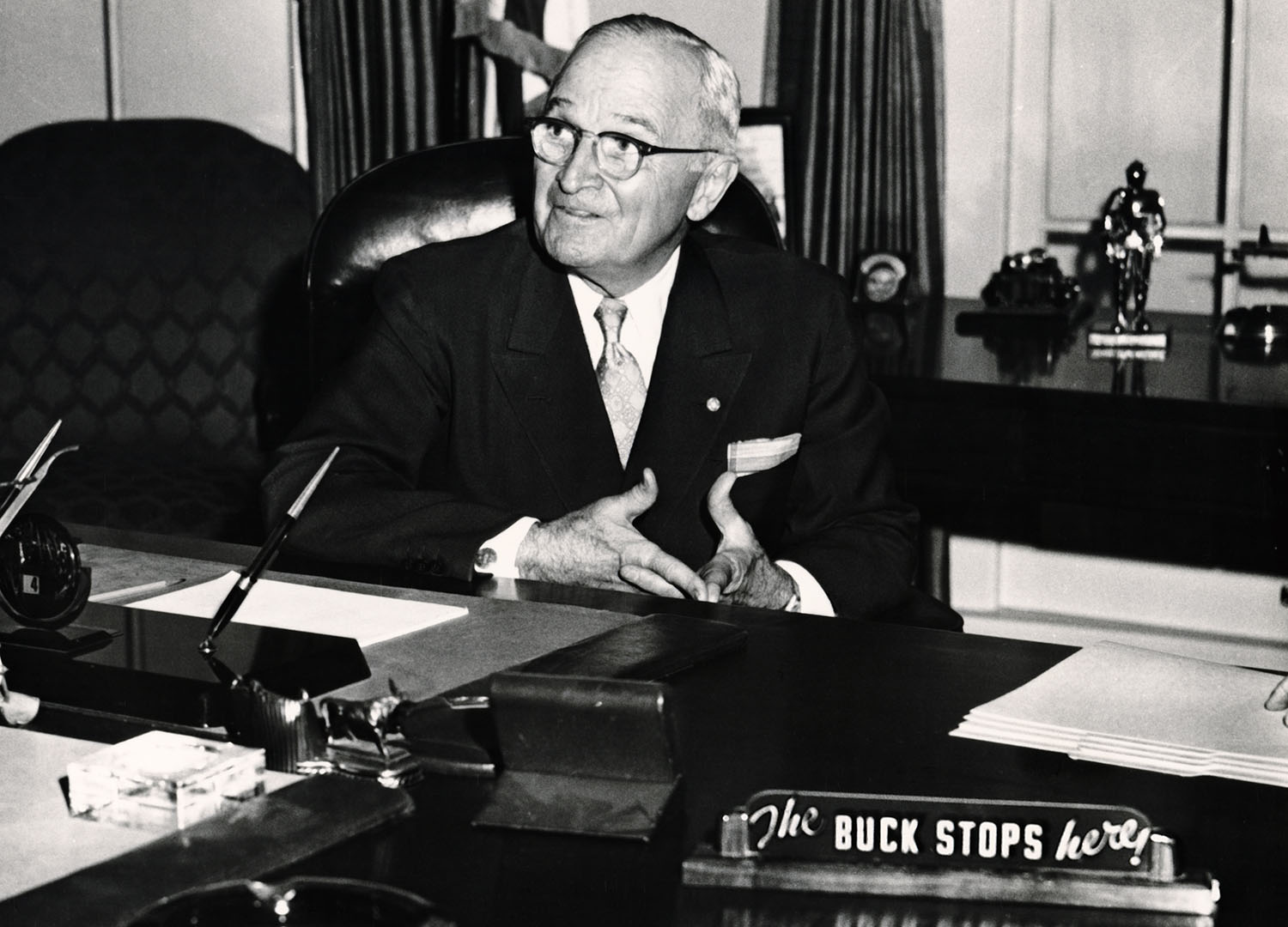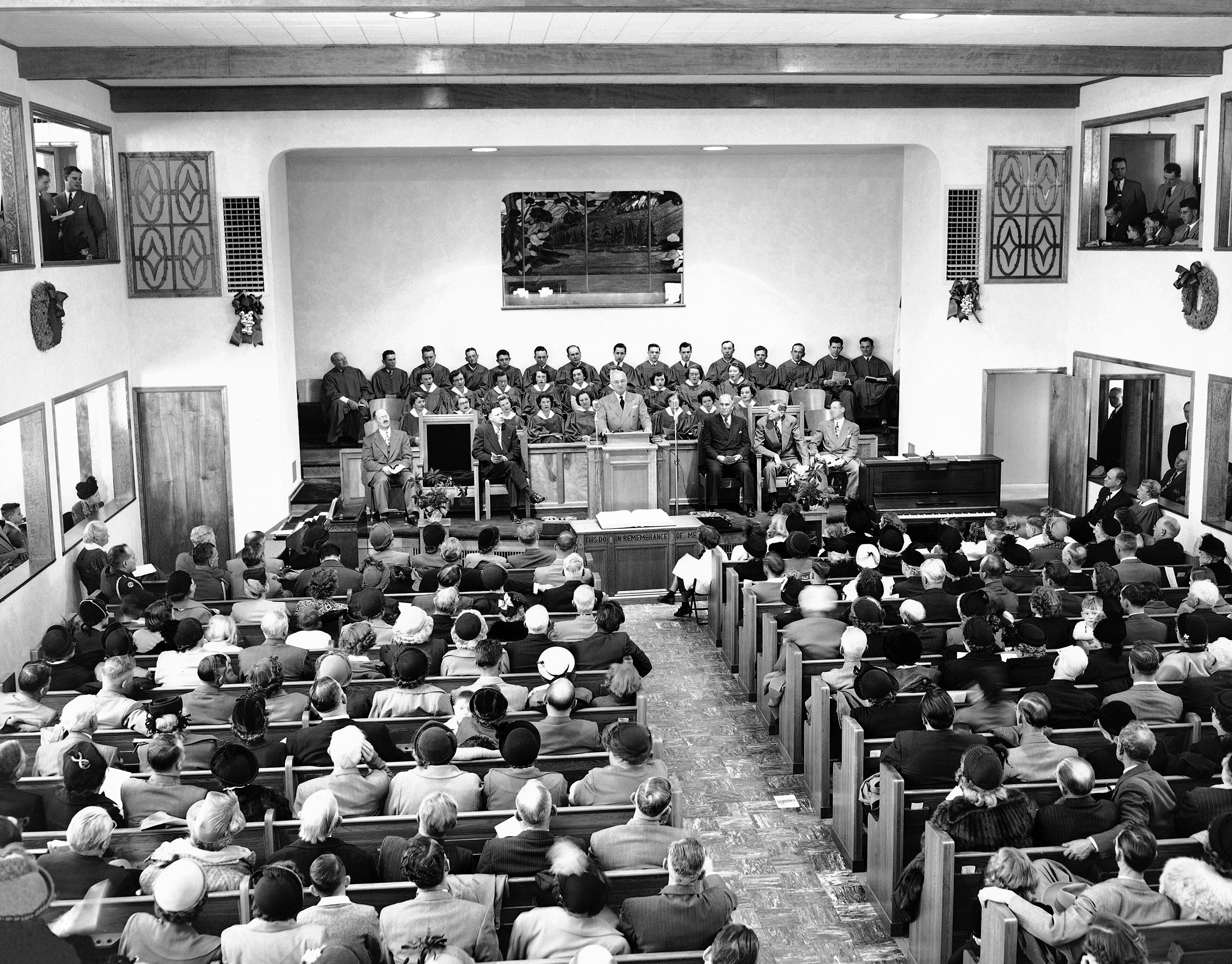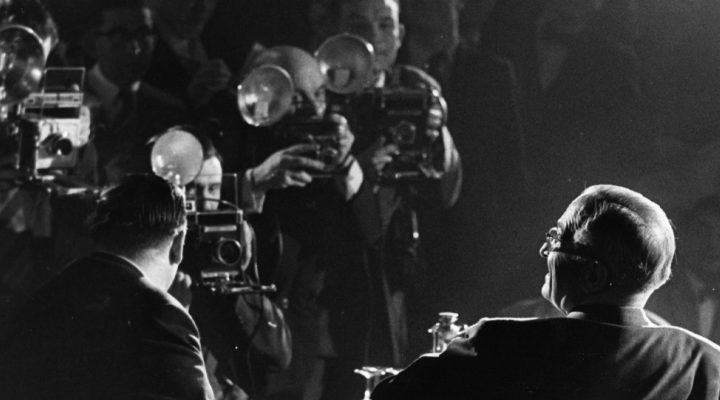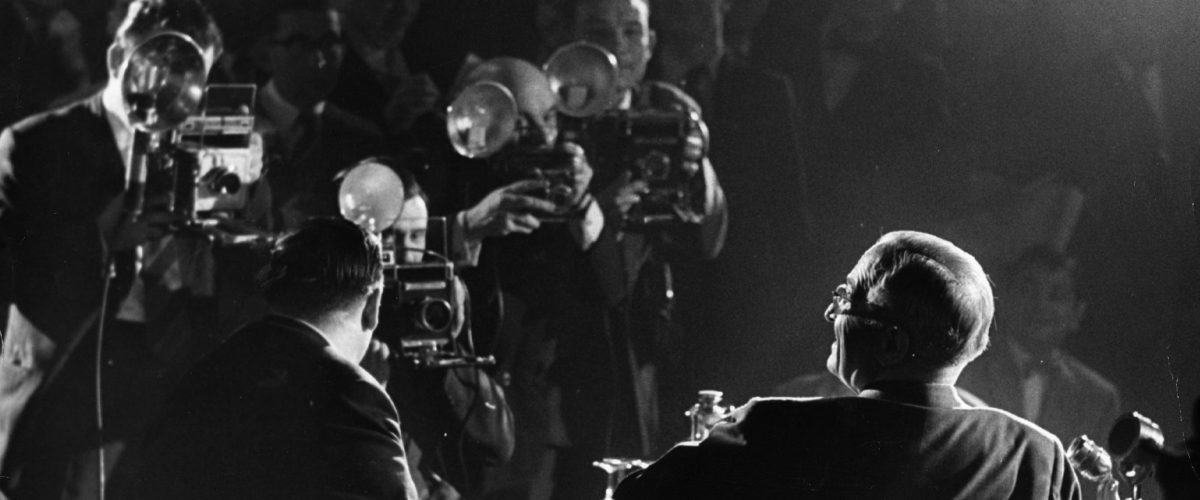American presidents must be prepared to respond to whatever questions might arise at a press conference. Presidents have answered or dodged difficult questions, or snapped, “No comment. Next question!”
In a 1949 press conference, Harry Truman made clear that as commander in chief, he dictated the defense policy of the United States — not generals, admirals, the joint chiefs of staff or the civilian secretaries of the Army, Navy or Air Force. The famous sign on his Oval Office desk made clear: “The buck stops here.”

American President Harry S. Truman seated in White House library, with ‘The Buck Stops Here’ on placard in foreground, circa 1950. (Photo by Fotosearch/Getty Images).
Harry Truman called on another reporter. “On several occasions recently, sir,” the reporter began, “you have said that your own political philosophy and that of the administration is based on the Sermon on Mount.”
“That’s right,” Truman answered.
The reporter followed up, “Would you care to expand, sir, on that theme and point out in what way…”
Truman interrupted the reporter: “My best advice to you is to turn to the fifth, sixth and seventh chapters of the Gospel according to St. Matthew in the King James translation, and read it very carefully, and you will find out without any comment from me.”
Reporters laughed. This reporter pressed for clarification: “Mr. President, some of us are not so familiar with the Bible. Is that the fifth, sixth and seventh …”
Again, Truman cut off the reporter: “Fifth, sixth and seventh chapters of the Gospel according to St. Matthew, the King James Version. Read those three chapters — won’t take you but 20 minutes.”
A reporter in the back of the room complained that he had been unable to hear the exchange between Truman and the reporter. Some reporters wondered how the focus had shifted from questions about Defense Department policy to words Jesus had spoken 2,000 years before. Truman attempted to clarify: “The Sermon on the Mount ‚ (I’m) talking about the Sermon on the Mount and my political philosophy. I advised him to read the Sermon on the Mount.”
Another reporter asked, “Do you agree with the Sermon on the Mount?”
Truman answered: “I do. I am in complete agreement with it.”
One can imagine newspaper headlines the next day or, in our day, the words scrolling across the bottom of the screen: “Breaking news: President agrees with Jesus.”
After Truman summarized the interaction for reporters on the back row, a few reporters scribbled in their notebooks, check out Sermon on the Mount. (No quick Google search for clarification in those days. Reporters would need to find an actual Bible.)
“Imagine today the president — or a presidential wannabe — being asked about words of Jesus.”
This may have been the only time in American history, at least in a presidential news conference, that a reporter asked about Jesus’ Sermon on the Mount. Imagine today the president — or a presidential wannabe — being asked about words of Jesus. Later over drinks, some reporters revisited the flow of the press conference. With all that was going on in the world, why were colleagues asking about a sermon?
Awareness of the Sermon on the Mount
Stanley Jones, a Methodist missionary who had discussed religion with Truman, equally appreciated the Sermon on the Mount.
“Most of us look at the Sermon on the Mount as a series of disconnected, or at the very best loosely connected, ethical exhortations,” he said. “In interpreting the Sermon on the Mount, we have often applied methods of historical criticism and have taken the words to mean what they meant in the Old Testament or in a contemporaneous setting. We may gain much by this method, but we may also entirely miss the point.”
To Harry Truman, a Southern Baptist, these three chapters in Matthew were not “scattered sayings out of the past” but “the word of the Lord.” As a child, Truman had read the Sermon on the Mount. He had learned the Beatitudes in Sunday school. The 111 verses that make up Jesus’s sermon were not “proof-texts” to shore up religious opinions or win religious arguments. They were a foundation to ethical living and, as Truman repeatedly declared, sound government.
Truman would have agreed with Anglican theologian John Stott: “The Sermon on the Mount is probably the best-known part of the teaching of Jesus, though arguably it is the least understood, and certainly it is the least obeyed.”
The New Catholic Bible calls it “The Magna Carta.”
These days, some Christians find the passages too idealistic to be practical in a polarized society and church. Russell Moore explained to Michelle Goldberg that he had become aware of “much more dismissal of the Sermon on the Mount’s relevance for contemporary Christians.”
Consider Jesus’ exhortations to turn the other cheek and love your enemies. Increasingly, Moore observed, “a perception of kindness equating weakness.” Pastors have complained to Moore about being challenged by congregants for preaching biblical ideas about mercy. The patriotic complainers retorted, “That doesn’t work anymore.”

President Harry S. Truman speaks from the pulpit of the Grandview, Mo., Baptist Church of which he is a member as he dedicates the new $102,000 structure, Dec. 24, 1950. More than 400 persons filled the auditorium for the ceremony. The Truman family has been affiliated with the Grandview church for nearly 100 years. (AP Photo/William J. Smith)
Benefits of reading and re-reading the Sermon on the Mount
Truman insisted that reading the Sermon on the Mount would “do reporters good.” Actually, he thought, the reading would do anyone good.
As a retired president, Truman was pulpit guest at Elmwood Methodist Church in Dallas on Sunday, Oct. 18, 1959. In his “sermon,” Truman insisted that repeated readings of the Sermom on the Mount would do Texas Methodists “some good.”
Truman, the Baptist, exhorted those longhorn Methodists, “Read the whole thing again — then, read it again — then, read it again.”
Some Methodists in the pews that morning must have been taken aback by Truman’s intensity.
“It won’t harm you,” the former president prodded, “to read it a hundred times, because the more you read it, the more of it will stick in your head.” Reading a passage multiple times, Truman believed, was a way to implement the Psalmist’s guidance, “Thy word have I hid in mine heart, that I might not sin against thee.”
Harry Truman read — and reread — the Sermon on the Mount dozens and dozens of times: As a barefooted schoolboy in Independence, as a bank clerk in Kansas City, as a farmer plowing fields in Grandview, as a soldier dodging enemy fire in France, as a bankrupt haberdasher, as presiding judge of the Jackson County Court, as a U.S. senator, as vice president, and as president, as an elderly retired gentleman in Independence.
The Sermon on the Mount that mesmerized Truman has attracted many admirers. Novelist Kurt Vonnegut observed, “If it weren’t for the message of mercy and pity in Jesus’ Sermon on the Mount, I wouldn’t want to be a human being. I would just as soon be a rattlesnake.”
Vonnegut traced his appreciation for the Sermon on the Mount to Powers Hapgood, a legendary socialist American trade union organizer who told Vonnegut: ‘I am enchanted by the Sermon on the Mount. Being merciful, it seems to me, is the only good idea we have received so far.”
In time, Vonnegut highlighted 12 words that composed “Jesus’ greatest legacy to us”: ‘Forgive us our trespasses as we forgive those who trespass against us.’” Vonnegut concluded, “For those 12 words alone, (Jesus) deserves to be called ‘the Prince of Peace’” and not only during the Christmas season.
My current writing project
Full disclosure, I am currently writing a book on Harry Truman’s spirituality. When asked what I am “working on,” my answer, spirituality, raises eyebrows. “Spirituality.”
“Spirituality,” you say. “You think Harry Truman was spiritual?”
Some have gotten specific in protesting my thesis: “Why Truman drank bourbon, he cursed in public, he didn’t attend church very often.” (That last protest is from Truman’s nephew). I try to explain that Truman was not “pious” or “religious” but he was deeply spiritual. The Sermon on the Mount was his spiritual Rock of Gibraltar.
This past summer as I edited the chapter on the press conference and his pulpitry with the good Texas Methodists, I was struck by an idea.
Do you remember the Pepsi Challenge? Blindfolded individuals were asked to sip two soft drinks and say which cola they preferred. And surprise, surprise, a high percentage preferred Pepsi. (After all, Pepsi was paying for the commercials.)
So, why not have a Truman Challenge in 2023? Why not read the Sermon on the Mount —Matthew 5, 6, 7 — a hundred times, recalling Truman’s insistence, “It won’t harm you.”
But which translation? Admittedly Truman considered the King James Version “the Bible as it should be.” Still he read different translations, particularly those presented to him by American Bible Society editors in White House photo ops. Nevertheless, he mumbled, “Why can’t they leave it as it is?”
I memorized the Beatitudes in vacation Bible school; actually some of the saints were impressed by my spirited breathless recitation during the “demonstration program” at week’s end.
But until writing this Truman book, I never had thought about deliberately and intentionally reading those three chapters 100 times.
I took the challenge
In August, I began the challenge. I have read the Sermon on the Mount in a variety of translations (some of which might not pass muster with some Southern Baptists).
“Concentrated exposure to the words and ideas of Jesus have challenged me.”
Concentrated exposure to the words and ideas of Jesus have challenged me. Does Jesus’ probation of calling a brother “a fool” mean I should not call a politician a “moron” or an “idiot.” More than once, I thought back to my childhood when some saints insisted, “God said it. I believe it. And that settles it for me!”
I have been hammered by the implications of some of those 111 verses. Notably, “give to the one who asks you.” Palm Springs, where I live, has a significant homeless or “housing insecure” problem that our politicians keep promising to do something about.
One result of my reading: I cannot easily walk by unhoused individuals pretending I do not see them. Or quickly wondering if there is another entrance or exit. And there has been the lingering aftertaste of the observation thought to have been first verbalized by John Bradford in the mid-16th century: “There but for the grace of God go I.”
It happened after having breakfast and editing this article at McDonald’s. I walked out the left front door and checked the driveway because drivers cut through recklessly. Looking to my right for traffic, I saw him. Standing near the other front door. Glad I exited through the left front door, I preceded to my car intending to go home and get back to editing. But that moment at McDonald’s presented a Damascus Road moment.
I reminded the Lord that I only had a $10 bill on me. I will not say the Lord exactly replied, “And what is wrong with giving him a $10?” Well, Lord, he might use it on beer or drugs. But might boomeranged: This man standing in front of a fast-food restaurant might be hungry.
I knew I would not be able to submit this article if I drove away. How do I know this man does not read Baptist News Global?
But Jesus also said — as one of the 111 verses — “But when you give to the needy, do not let your left hand know what your right hand is doing, so that your giving may be in secret. Then your Father, who sees what is done in secret, will reward you.” I had just read those words at the start of the morning.
I reached into my wallet and pulled out the $10. I folded it so the man could not see it was a $10. That way, I figured, God would “reward” me with a replacement $10.
The man mumbled, “God bless you” and I walked away. Then he exclaimed, “Wow!” I turned and his face was one huge smile.
Admittedly, I did not take advantage of the moment and share the gospel with him or say, “God has a wonderful plan for your life.” I could have. Maybe I should have?
What are you pretending not to know?
My late psychologist friend Frank Freed used to ask counseling clients, “What are you pretending not to know?” That moment at McDonald’s the question could have been amended, “What are you pretending not to see?”
God’s timing. A hungry man’s timing.
As I write this, I have read the Sermon on the Mount 92 times. I seem to be reading it with different eyes than the first readings. Some of Jesus’ words have hung with me after I have crossed off other items on my day’s agenda.
So, instead of a New Year’s resolution, might you be ready to take The Truman Challenge? Might you invest in an “Ask Me About the Truman Challenge” T-shirt or sweatshirt?
Jesus’ words on the mountainside have challenged me in ways they have not in small group Bible studies, or Sunday school, or graduate courses in theology.
If you take the challenge, I offer a piece of advice from my mentor Charlie Shedd. Charlie taught me that three symbols could enhance your reading: A heart, a question mark and an arrow.
Charlie taught me to draw a small heart in the margin of a verse: “I like this.”
Charlie taught me to draw a question mark in the margin of a verse signifying: “I don’t understand this?” or “What might be the impact if I take this verse seriously?”
Charlie taught me to draw an arrow in the margin of a verse: “This verse stings!”
I will not promise that reading the Sermon on the Mount 100 times in 2023 will turn you into a spiritual giant or, as preachers often said in Kentucky, “Make you on fire for God.”
Truman was right: “It won’t harm you to read it a hundred times, because the more you read it, the more of it will stick in your head.”
If you bog down at 20 times, in the words historian David McCullough said to me on a writing project, “Keep at it. Keep at it.”
And don’t be surprised when reading, if at some moment, unexpectedly, one of these 111 verses pops up and goes “Boo!”
I wish I knew how many of those reporters or how many of those Methodists took The Truman challenge. But I suspect if any did they were challenged and perhaps changed at the core of their being.
Remember: “It will do you some good.”
Harold Ivan Smith is thanatologist and independent scholar. For 18 years he served on the teaching faculty of Saint Luke’s Hospital in Kansas City, Mo. He earned graduate degrees from Scarritt College, Vanderbilt University, and a doctor of ministry degree from Asbury Theological Seminary. His writings include A Decembered Grief, On Grieving the Death of a Father; Grieving the Death of a Mother; When You Don’t Know What to Say; When a Child You Know Is Grieving, When Your People Are Grieving: Leading in Times of Loss.


